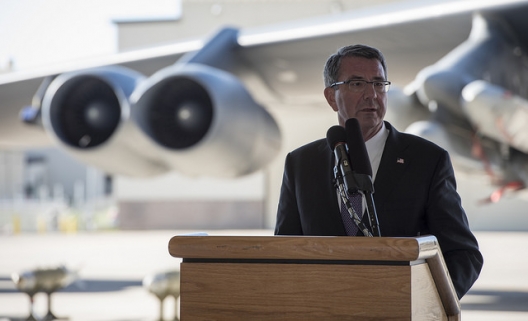 From Jim Garamone, DoD News: Defense Secretary Ash Carter kicked off a visit to DoD’s nuclear deterrence enterprise , telling airmen at Minot Air Force Base, North Dakota, that DoD will invest, innovate and sustain to rebuild that enterprise’s capabilities that remain the bedrock of U.S. defense strategy….
From Jim Garamone, DoD News: Defense Secretary Ash Carter kicked off a visit to DoD’s nuclear deterrence enterprise , telling airmen at Minot Air Force Base, North Dakota, that DoD will invest, innovate and sustain to rebuild that enterprise’s capabilities that remain the bedrock of U.S. defense strategy….
“At a strategic level, of course, you deter large-scale nuclear attack against the United States and our allies,” he said. “You help convince potential adversaries that they can’t escalate their way out of failed conventional aggression. You assure allies that our extended deterrence guarantees are credible — enabling many of them to forgo developing nuclear weapons themselves, despite the tough strategic environment they find themselves in and the technological ease with which they could develop such weapons. And, if deterrence fails, you provide the president with options to achieve U.S. and allied objectives — a responsibility that I know President Obama takes with the utmost seriousness, as you do — all to reduce the risk of nuclear weapons being used in first place….”
[T]he nuclear landscape has changed and it will continue to pose challenges, Carter said.
“One way the nuclear landscape has changed: we didn’t build new types of nuclear weapons or delivery systems for the last 25 years, but others did, at the same time that our allies in Asia, the Middle East, and NATO did not,” the secretary said, — “so we must continue to sustain our deterrence.”
Russia has modernized its nuclear arsenal, and there is some doubt about Russian leaders’ strategies for the weapons….
“We back all of that up with the commitment that any attack on America or our allies will be not only defeated, but that any use of nuclear weapons will be met with an overwhelming and effective response,” Carter said….
A large-scale nuclear attack is not likely, the secretary said. The most likely scenario is “the unwise resort to smaller but still unprecedentedly terrible attacks, for example by Russia or North Korea, to try to coerce a conventionally superior opponent to back off or abandon an ally during a crisis,” Carter said. “We cannot allow that to happen, which is why we’re working with our allies in both regions to innovate and operate in new ways that sustain deterrence and continue to preserve strategic stability.”
NATO is reexamining the nuclear strategy to integrate conventional and nuclear deterrence to deter Russia, he said….
“We’re now beginning the process of correcting decades of under-investment in nuclear deterrence,” the secretary said.
From Ash Carter, Department of Defense: Across the Atlantic, we’re refreshing NATO’s nuclear playbook to better integrate conventional and nuclear deterrence to ensure we plan and train like we’d fight and to deter Russia from thinking it can benefit from nuclear use in a conflict with NATO, from trying to escalate to de-escalate, as some there call it.
Now, obviously, we do not seek such a conflict to begin with. Rather, we seek to prevent one. And by having our dual capable aircraft, B-61 bombs and air launch cruise missiles postured as credible response options, options intended to deter, we make limited use of nuclear weapons by others less likely….
[H]ere in the United States, we’re sustaining deterrence by taking steps to ensure that all three legs of our nuclear triad do not age into obsolescence. This is part of our government’s policy, which President Obama made clear in Prague in 2009 when he said that, and I quote, “As long as these weapons exist, the United States will maintain a safe, secure and effective arsenal to deter any adversary and guarantee that defense to our allies.”
Excerpts from remarks by Secretary of Defense Ash Carter to troops at Minot Air Force Base, North Dakota, September 26, 2016.
Image: Secretary of Defense Ash Carter, Sept. 26, 2016 (photo: Sgt. Brigitte Brantley/Department of Defense)
